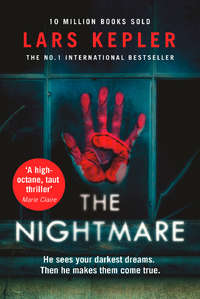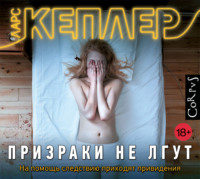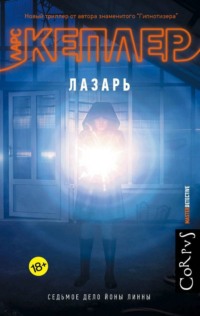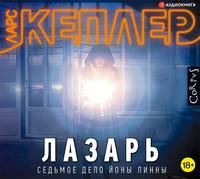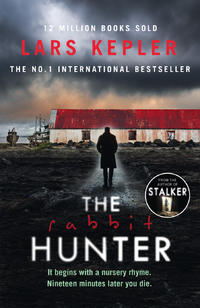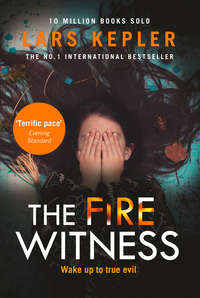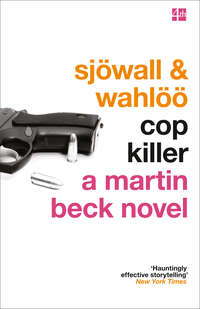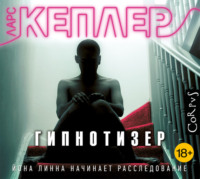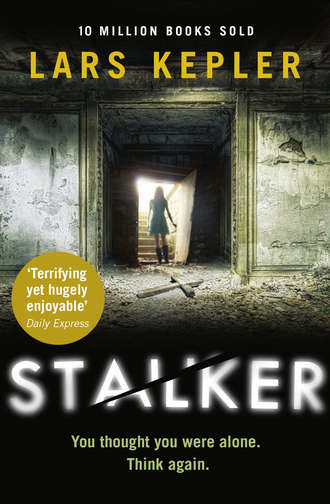
Полная версия
Stalker
‘How was the match?’ Jackie asks.
‘One-one,’ the girl replies. ‘Anna scored our goal.’
‘But it was your pass,’ the woman says kindly.
‘Thanks for bringing Maddy home,’ Jackie says.
‘My pleasure … on the way we talked about not having to be the best in the world, but that maybe she could be a bit pushier.’
Erik doesn’t hear Jackie’s reply, but the door closes and then Jackie kneels down in front of her daughter and feels her hair and face gently.
‘So you’re going to have to be a bit pushier,’ she says softly.
She returns to Erik, apologises for the interruption, sits down and explains what he should do next.
Erik struggles to get his hands to work independently of each other, and feels his back start to sweat.
After a while the little girl comes into the room. She’s changed into a casual dress and sits down on the floor to listen.
Erik tries to play the section, but gets the fourth bar wrong, starts again, but makes the same mistake, and laughs at his own failure.
‘What’s so funny?’ Jackie asks calmly.
‘Just that I’m playing like a broken robot,’ Erik replies.
‘My hedgehog makes mistakes as well,’ Madeleine says consolingly, holding up her stuffed toy.
‘My left hand is the worst,’ Erik says. ‘It’s as if my fingers don’t want to hit the right bits.’
Madeleine blinks but manages to keep a straight face.
‘Keys, I mean,’ Erik says quickly. ‘Maybe your hedgehog says “bits”, but I say keys.’
The girl looks down with a broad grin. Jackie gets up from her chair.
‘You need to rest,’ she says. ‘We’ll run through the first bit of musical theory before we end the lesson.’
‘I’ll go and put the dishwasher on,’ the girl says.
‘You know it’s bedtime soon – you’ll have to make sure you’ve got time.’
They sit down at the table. Erik picks up the jug and pours two glasses of water. It feels impossible not to sneak glances at Jackie as she explains about G-clef, F-clef, and different overtones. Her blouse is creased at the waist, and her face looks thoughtful. He can make out her simple bra and breasts beneath the silk.
He feels a nervous temptation in being able to look at her without her knowing.
He carefully shifts position so he can see up between her thighs and catch a glimpse of her plain white underwear.
His heart beats faster as she parts her legs slightly, he has a feeling that she knows she’s being looked at.
She takes a sip of water.
Her open eyes are only just visible behind her dark glasses.
He looks between her thighs again, leans a little closer, but the next moment she crosses her legs and puts the glass down.
Jackie smiles and then says that she imagines that he works as a lecturer at the university, or as a priest. Erik replies that the truth is somewhere in between, and tells her about his work at the Psychology Clinic, and his research into hypnosis, then falls silent.
She gathers together the various sheets of music theory, taps them on the table to neaten them, then puts them down in front of him.
‘Can I ask you something?’ Erik asks.
‘Yes,’ she says simply.
‘You turn your face towards me when you talk – does that come naturally, or do you have to learn that?’
‘It’s a concession to what sighted people find pleasant,’ she answers honestly.
‘That’s what I thought,’ Erik says.
‘Like switching the light on when you enter a room to alert sighted people that you’re there …’
She falls silent and her slender fingers trace the rim of her glass.
‘Sorry, I’m being horribly rude and embarrassing, asking about such things …’
‘Most people prefer not to talk about their impaired vision. Which I can understand,’ Jackie says. ‘We’d all rather be seen as individuals and all that … but I think it’s better to talk.’
‘Good.’
He looks at her soft pink lipstick, the curve of her cheekbones, her boyish haircut and the green-tinted vein pulsing in her neck.
‘Isn’t it odd, being able to hypnotise other people and see into their secret, private thoughts?’ she asks.
‘It’s not like I’m spying on them.’
‘Isn’t it?’
25
The bright sky is reflected in the cellophane covering the carton of ten packets of cigarettes on the seat beside Erik as he slowly drives into the area of parkland, past a sign saying that access is prohibited and that all visits must be announced in advance.
Karsudden District Hospital is the largest secure psychiatric facility in Sweden, with room for one hundred and thirty criminals who have been sentenced to treatment rather than prison as a result of mental illness.
His stomach is churning with anxiety. Soon he will be seeing Rocky Kyrklund, to ask him about his supposed alibi.
If it is genuine, then the latest murder could be connected to the old one, and Erik will have to tell the police everything.
Because if Rocky was innocent, there may well be parallels between the old murder and the new one. And it would be no coincidence that Susanna Kern was found with her hand strapped to her ear.
It’s not inevitable that I’ll lose my job, he tells himself. That will depend on whether the police decide to pass the case on to a prosecutor.
In front of the entrance to the administrative block is a sign showing a camera with a line across it. Yet at the same time this place is full of surveillance cameras, Erik thinks.
He picks up the cigarettes and starts to walk towards the white building.
A snail’s trail shimmers across the path in front of the reception area.
In the sharp sunlight inside the doors, the dust is clearly visible as it drifts towards the battered furniture and worn floor.
Erik shows his ID, is given a name badge, and gets no further than the magazine rack next to the waiting area before a man with blond highlights in his hair comes in.
‘Erik Bark?’
‘Yes,’ Erik replies.
The man stretches his lips into a semblance of a smile, and introduces himself as Otto. There’s something exhausted about the man’s face, a sadness that’s impossible to hide.
‘Casillas would have liked to have been here himself, but …’
‘I understand, don’t worry,’ Erik says, and feels his face flush as he thinks of his lies about Dr Stünkel and the research project.
They set off, and the man explains that he’s a care assistant, and has worked at Karsudden for years.
‘We’ll go the long way round … no one likes the tunnels,’ Otto mutters as they head outside.
‘Do you know Rocky Kyrklund?’ Erik asks.
‘He was here when I started,’ Otto says, gesturing towards the high fences and dismal brown buildings.
‘What do you make of him?’
‘A lot of people are a bit frightened of Kyrklund,’ he replies.
They go in through Entrance D, and over to a locker room where Erik has to leave any loose possessions.
‘Can I take the cigarettes with me?’ Erik asks.
Otto nods. ‘They’ll probably come in useful.’
The orderly puts Erik’s keys, pen, mobile and wallet in a plastic bag, seals it and hands him a receipt.
Then he unlocks a heavy door that leads to another door with a coded lock. They pass through and walk down a corridor with a grey linoleum floor and secure doors leading to small rooms with beds in them.
The air is heavy with disinfectant and stale cigarette smoke.
From one room comes the sound of a porn film. The door is open and Erik sees a fat man lean forward on a plastic chair and spit on the floor.
They go through another airlock and find themselves in a shadowy exercise yard. Six-metre-high fences link two brick buildings, forming a cage around a yellowing patch of grass edged with cinder paths.
A skinny man in his twenties is sitting on a park bench, his face tense. Two carers are talking over by one of the brick walls, and at the far end a thickset man is standing facing the fence.
‘Do you want me to come with you?’ Otto asks.
‘No need.’
The former priest is standing smoking as he faces the high fence. His eyes are roaming across the grass of the parkland towards the leafy trees. By his feet is a mug of instant coffee.
Erik walks along the path, which is littered with cigarette butts and discarded plugs of chewing tobacco.
I’m about to meet the priest I let down because I’d already judged him, he thinks. If Rocky Kyrklund does have an alibi, I’m going to confess what I did to the police, and take the consequences.
Dust from the path swirls around his legs, and he knows Rocky can hear him approaching.
‘Rocky?’ he says.
‘Who wants to know?’
‘My name is Erik Maria Bark.’
Rocky lets go of the fence and turns round. He’s tall, one metre ninety. His shoulders are even broader than Erik remembers, he’s got a full beard, specked with grey, and back-combed hair. His eyes are green, and his face radiates a chilly pride. He’s wearing a pilled, camouflage-green sweater with worn elbows. His sturdy arms are hanging by his sides, a cigarette clasped between his fingers.
‘The senior consultant said you liked Camels,’ Erik says, and attempts to give him the cigarettes.
Rocky juts his chin out and looks down at him. He doesn’t reply, and shows no sign of accepting the gift.
‘I don’t know if you remember me,’ Erik says. ‘I was involved in your trial nine years ago, I was part of the group that conducted the psychological assessment.’
‘What conclusion did you reach?’ Rocky says in a dark voice.
‘That you needed neurological and psychiatric treatment,’ Erik replies calmly.
Rocky flicks his glowing cigarette at Erik. It hits him in the chest and falls to the ground. A few sparks fly out.
‘Go in peace,’ Rocky says calmly, then purses his lips.
Erik stubs the cigarette out and sees that two carers are approaching across the grass, carrying an alarm.
‘What’s going on here?’ one of them asks as they stop.
‘It was an accident,’ Erik says.
The men stay for a few moments, but neither Erik nor Rocky say anything. In the end the guards go back to their coffee.
‘You lied to them,’ Rocky says.
‘I do that sometimes,’ Erik replies.
Rocky’s face remains impassive, but there’s a flicker of interest in his eyes now.
‘Have you received neurological and psychiatric treatment?’ Erik asks. ‘You have a right to it. I’m a doctor, do you want me to look at your notes and rehabilitation plan?’
Rocky shakes his head slowly.
‘You’ve been here for a long time, but have never applied for parole.’
‘Why would I do that?’
‘Don’t you want to get out?’
‘I accept my punishment,’ Rocky says in his deep voice.
‘You had trouble remembering back then – is that still the case?’ Erik asks.
‘Yes.’
‘But I remember our conversations, and sometimes it sounded like you thought you were innocent of the murder.’
‘Naturally … I surrounded myself with lies in an attempt to escape, they crawled all over me like a swarm of bees, and I tried to avoid responsibility by blaming someone else.’
‘Who?’
‘That doesn’t matter … I was guilty, but I let the lies crawl all over me.’
Erik bends over and puts the cigarettes down at Rocky’s feet, then takes a step back.
‘Do you want to talk about the person you wanted to blame?’ he asks.
‘I don’t remember, but I know I thought of him as a preacher, an unclean preacher …’
The priest falls silent and turns back towards the fence. Erik goes and stands next to him and looks out at the trees.
‘What was his name?’
‘I can’t remember names any more, I don’t remember their faces, scattered like ashes …’
‘You called him a preacher – was he a colleague of yours?’
Rocky’s fingers clutch the fence and his chest rises and falls as he breathes.
‘I only remember that I was scared, that was probably why I tried to blame him.’
‘You were scared of him?’ Erik asks. ‘What had he done? Why were you …’
‘Rocky? Rocky!’ says a patient who has walked up behind them. ‘Look what I’ve got for you!’
They turn round and see the skinny man holding out a jam biscuit in a napkin.
‘Eat it yourself,’ Rocky says.
‘I don’t want to,’ the other inmate says eagerly. ‘I’m a sinner, God and His angels hate me, and—’
‘Shut up!’ Rocky roars.
‘What have I done? Why are you—’
Rocky takes hold of the man by the chin, looks him in the eyes, then spits in his face. The man loses his balance when Rocky lets go, and the biscuit falls to the ground.
The guards approach across the grass again.
‘What if someone came forward and gave you an alibi?’ Erik says quickly.
Rocky’s green eyes stare into his without blinking.
‘Then they’d be lying.’
‘Are you sure about that? You don’t remember anything from—’
‘I don’t remember an alibi, because there wasn’t one,’ Rocky interrupts.
‘But you do remember your colleague – what if he was the one who murdered Rebecka?’
‘I murdered Rebecka Hansson,’ Rocky says.
‘Do you remember that?’
‘Yes.’
‘Do you know anyone called Olivia?’
Rocky shakes his head, then looks towards the approaching guards and raises his chin.
‘Before you ended up here?’
‘No.’
The guards push Rocky up against the fence, hit the backs of his knees, force him to the ground and put handcuffs on him.
‘Look out for him!’ the other patient cries.
The larger of the guards puts his knee on Rocky’s back while the other one holds his baton to his throat.
‘Look out for him …’ the other patient sobs.
As Erik follows one of the guards away from Ward D, he starts to smile to himself. There is no alibi. Rocky killed Rebecka Hansson, and there’s no connection between the murders.
Out in the car park he stops and takes several deep breaths as he looks up past the trees in the park at the bright sky. A feeling of liberation is spreading through his body, as a longstanding burden is lifted from his shoulders.
26
Nils Åhlén, professor of forensic medicine, pulls in and parks his white Jaguar across two parking spaces.
The National Criminal Investigation Department want him to take a look at two homicides.
Both bodies have already been through post-mortems. Åhlén has read the reports. They’re beyond reproach, far more thorough than is strictly necessary. Even so, the head of the preliminary investigation has asked him to take a second look at both bodies. They’re still fumbling in the dark, and want him to try to identify any subtle similarities, signatures or messages.
Margot Silverman believes she’s dealing with a narcissistic serial killer, and thinks the murderer is trying to communicate.
Åhlén leaves his car and breathes in the morning air. There’s almost no wind today, the sun is shining and the blue blinds have been lowered in all the windows.
There’s something next to the entrance. At first Nils Åhlén thinks someone’s dumped rubbish behind the railing of the little concrete steps, but then he sees that it’s a human being. A bearded man is asleep on the tarmac, with his back leaning against the cement foundations of the brick wall. He’s wrapped in a blanket, and his forehead is resting against his tucked-up knees.
It’s a warm morning, and Åhlén hopes the man is left to sleep in peace before the security guards find him. He adjusts his aviator’s sunglasses and walks towards the door, but stops when he notices the man’s clean hands and the white scar running across his right knuckles.
‘Joona?’ he asks gently.
Joona Linna raises his head and looks at him, as though he wasn’t asleep, just waiting to be addressed.
Åhlén stares at his old friend. Joona is almost unrecognisable. He’s lost a lot of weight, and is sporting a thick, fair beard. His pale face is grey, with dark rings under his eyes, and his hair is long and messy.
‘I want to see the finger,’ he says.
‘I might have guessed.’ Åhlén smiles. ‘How are you? You look OK.’
Joona takes hold of the railings and pulls himself up heavily, then picks up his bag and stick. He knows how he looks, but he can’t help it, he’s still grieving.
‘Did you fly or drive down?’ Åhlén asks.
Joona peers at the lamp above the door. At the bottom of the glass under the bulb is a small heap of dead insects.
After Saga’s visit, Joona went with his daughter Lumi to visit Summa’s grave in Purnu. Then they walked down to the little sandy beach at Autiojärvi and talked about the future.
He knew what she wanted to do, without her having to say anything.
In order for Lumi not to lose her place at the Paris College of Art, she had to be there to enrol in two days’ time. Joona arranged for her to live with his friend Corinne Meilleroux’s sister in the eighth arrondissement. They didn’t have time to make too many other arrangements, but he gave Lumi enough money to get by.
And a whole load of useful tips about close combat and automatic weapons, she joked.
He drove her to the airport, and it took a real effort not to go to pieces. She gave him a hug and whispered that she loved him.
‘Or did you catch the train?’ Åhlén asks patiently.
He returned to the house in Nattavaara, dismantled the alarm system, locked the weapons in the cellar, and packed a rucksack. Once he’d turned the water off and shut the house up, he walked to the railway station and caught the train to Gällivare, made his way to the airport and flew to Arlanda, then caught the bus in to Stockholm. He covered the last five kilometres to the campus of the Karolinska Institute on foot.
‘I walked,’ he replies, without noticing the look of surprise on Åhlén’s face.
Joona waits, with one hand on the black iron railings as Åhlén unlocks the blue door. They walk together along the corridor with its muted colours and worn floor.
Joona can’t walk quickly with his stick, and has to stop and cough several times.
They pass the door to the toilets and are approaching a window containing a large pot plant that seems to consist mainly of roots. Dandelion seeds are drifting through the air in the sunshine outside. Something moves unexpectedly out there. Joona’s instinct is to duck down and draw his gun, but he forces himself to walk over to the window instead. An old woman is standing on the pavement, waiting for a dog that’s running back and forth among the dandelions.
‘How are you?’ Åhlén asks.
‘I don’t know.’
Joona’s body is trembling, and he goes into the toilet, leans over the basin and drinks some water straight from the tap. He straightens up and dries his face with a paper towel, then goes back out into the corridor.
‘Joona, I’ve got the finger in the locked cabinet in the pathology lab, but … I’m meeting Margot Silverman in half an hour … You can wait in my room instead if you don’t feel up to it—’
‘It doesn’t matter,’ Joona interrupts.
27
Nils Åhlén opens the swing-door to the pathology lab, and holds it open for Joona. Together they walk into the bright room with its shimmering white tiles. Joona puts his rucksack down by the wall next to the door, but keeps the blanket round his shoulders.
A cloying stench of decay lingers over the room in spite of the whirring fans. There are two bodies on the post-mortem tables. The more recent one is covered, and blood is slowly trickling down the stainless steel gutter.
They go over to the desk with the computer. Joona waits quietly as Åhlén unlocks a heavy door.
‘Sit down,’ he says as he puts the glass jar on the table.
He pulls a folder out of a box, opens it and places the test results from the National Forensics Lab, the old ID documents, the fingerprint analysis and enlargements of the images from Saga’s phone in front of Joona.
Joona sits down and stares at the jar. After a few seconds he picks it up, holds it up to the light, examines it closely, and nods.
‘I’ve kept everything here because I had a feeling you’d show up,’ Åhlén says. ‘But, like I said on the phone, you’ll see that it all checks out. The old man who found the body cut the finger off, as you can see from the angle of the cut … and that happened long after death, just as he explained to Saga.’
Joona carefully reads the report from the laboratory. They had built up a DNA profile based on thirty STR regions. The match was one hundred per cent, thus confirming the results of the fingerprint analysis.
Not even identical twins have the same fingerprints.
Joona lays out the photographs of the mutilated body in front of him and examines the violet-coloured entry-wounds.
He leans back and closes his burning eyelids.
Everything checks out.
The angles of the shots are just as Saga described. The size and constitution of the body, the size of the hand, the DNA, the fingerprint …
‘It’s him,’ Åhlén says quietly.
‘Yes,’ Joona whispers.
‘What are you going to do now?’ Åhlén asks.
‘Nothing.’
‘You’ve been declared dead,’ Åhlén says. ‘There was a witness to your suicide, a homeless man who—’
‘Yes, yes,’ Joona interrupts. ‘I’ll sort it out.’
‘Your flat was sold when your estate was wound up,’ Åhlén explains. ‘They got almost seven million for it, the money went to charity.’
‘Good,’ Joona says bluntly.
‘How has Lumi taken everything?’
Joona looks over at the window, watching the slanting light and the shadows of the dirt on the glass.
‘Lumi? She’s gone to Paris,’ he replies.
‘I mean, how did she deal with you coming back after so many years, how has she dealt with the loss of her mother, and …’
Joona stops listening to Åhlén as memories spread out inside him. More than a year ago he made his way in secret to Finland. He thinks about the afternoon when he arrived at the gloomy Radiotherapy and Cancer Clinic in Helsinki to fetch Summa. She could still walk with a Zimmer frame at the time. He can remember exactly how the light fell in the foyer, reflecting off the floor, the windows and pale woodwork, as well as the row of wheelchairs. They walked slowly past the unstaffed cloakroom and the confectionery machine and emerged into the fresh winter air.
Åhlén’s phone buzzes, and he pushes his sunglasses up onto his nose and reads the text message.
‘Margot’s here, I’ll go and let her in,’ he says, and heads towards the door.
Summa had chosen to have palliative care in her flat on Elisabetsgatan, but Joona took her and Lumi to her grandmother’s house in Nattavaara, where they had six happy months together. After the years of chemotherapy, radiation, cortisone and blood transfusions, all that was left was pain relief. She had morphine patches that lasted for three days, and took another 80 milligrams of OxyNorm every day.
Summa loved the house and the countryside around it, the air and light that streamed into the bedroom. Her family was together at last. She grew thinner, lost her appetite, lost all the hair on her body, and her skin became as soft as a baby’s.
Towards the end she weighed almost nothing, her whole body hurt, but she still liked it when Joona carried her round, and sat her on his lap so they could kiss.
28
Joona sits motionless, staring at the glass jar containing the amputated finger. The particles in the liquid have sunk to the bottom.
He really is dead.
Joona smiles to himself as he repeats the sentence in his head.
Jurek Walter is dead.
He disappears into recollections of his staged suicide, and is still sitting there with the blanket round his shoulders when Margot Silverman and Nils Åhlén come into the pathology lab.


